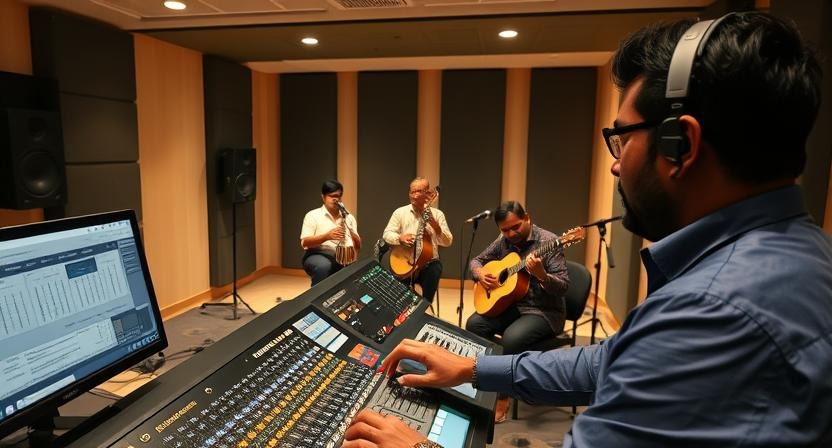Music is more than just an art form, it is a vast industry that offers countless Music Career Paths and opportunities for those passionate about sound, creativity, and expression. While many people associate a career in music with singing or performing on stage, the industry extends far beyond that. There are various roles in composing, production, sound engineering, education, therapy, and even technology-driven music applications. Whether you dream of being a vocalist, a music producer, a teacher, or someone working behind the scenes, there is a place for you in the world of music. Here’s an exploration of ten enriching music career options:
1. Singer (Film Industry, Classical, Independent)
Vocalists are the heartbeats of melodies, enchanting audiences across various genres. In India, singers can immerse themselves in Film Industry cinematic tunes, delve into the rich traditions of classical music, or carve unique paths as independent artists. The versatility in singing careers allows artists to perform in diverse settings, from grand stages to intimate gatherings, each offering a unique connection with the audience. The demand for singers spans across live performances, studio recordings, and digital platforms, providing a wide array of opportunities for aspiring vocalists.
2. Music Composer as a music career path

Composers are the architects of musical landscapes, crafting original pieces for films, advertisements, video games, and more. Their creations set the tone and evoke emotions, making them indispensable in storytelling across media. The demand for original compositions spans various industries, offering composers a broad spectrum of opportunities. In the dynamic world of media, composers play a pivotal role in enhancing narratives, creating memorable jingles, and developing scores that resonate with audiences long after the visuals fade.
3. Sound Engineer

Sound engineers are the maestros behind the scenes, ensuring that every note and beat resonates with clarity. They manage technical aspects of sound during live performances and studio recordings, playing a critical role in delivering high-quality audio experiences. Their expertise ensures that the audience receives the intended auditory experience, be it through a live concert, a studio album, or a broadcast event. The precision and creativity of sound engineers contribute significantly to the overall impact of musical productions.
Also Read: Free Guide: How Music Institutes Can Inspire Parents to Support a Music as a career for Their Child
4. Music Teacher (Online & Offline)
Educators in music nurture the next generation of talent, offering lessons in schools, conservatories, or through virtual platforms. They impart knowledge of instruments, vocal techniques, and music theory, fostering both skill and appreciation in students. The rise of online education has expanded their reach, allowing them to connect with students worldwide. Music teachers play a vital role in shaping the musical journey of individuals, inspiring creativity, discipline, and a lifelong appreciation for the art form.
5. Instrumentalist (Guitarist, Pianist, Drummer)

Instrumentalists breathe life into compositions, performing solo or as part of ensembles. Their expertise with instruments like the guitar, piano, or drums adds depth to musical pieces, making them sought-after for recordings, live shows, and teaching roles. Their versatility allows them to collaborate across genres and settings, enriching the musical landscape with their unique sounds and styles. Instrumentalists often find opportunities in orchestras, bands, studios, and educational institutions, showcasing the diverse applications of their craft.
6. Music Therapist
Music therapists harness the healing power of music to improve mental and emotional well-being. They work with individuals facing challenges such as stress, anxiety, or developmental disabilities, using music as a therapeutic tool to promote healing and enhance quality of life. This field combines musical proficiency with empathy and psychological insight, offering a unique blend of art and science. Music therapists collaborate with healthcare professionals to design and implement therapeutic interventions, demonstrating the profound impact of music beyond entertainment.
7. Film & Ad Jingle Composer
These composers create catchy tunes that linger in the listener’s mind, enhancing brand recognition and storytelling in advertisements and films. Their work requires creativity and an understanding of marketing dynamics, as they craft melodies that align with a brand’s identity and appeal to target audiences. The ability to condense a message into a brief musical piece that resonates with listeners is a valuable skill in the advertising industry. Film and ad jingle composers contribute significantly to the memorability and effectiveness of visual media campaigns.
8. YouTube Musician & Content Creator
The digital age has opened stages on platforms like YouTube, where musicians can share their art globally. Content creators produce music videos, tutorials, and performances, building personal brands and engaging with audiences directly. This avenue offers creative freedom and the potential for monetization through views, sponsorships, and merchandise. The accessibility of digital platforms allows musicians to reach diverse audiences, experiment with various content formats, and receive immediate feedback, fostering a dynamic and interactive musical journey.
9. Music App Developer (Tech + Music)

At the intersection of technology and music, app developers create tools that enhance how we experience and create music. From learning apps to digital instruments, they innovate solutions that make music more accessible and interactive. This role requires a blend of coding skills and musical understanding, reflecting the evolving nature of the music industry. Music app developers contribute to educational platforms, entertainment applications, and professional tools, showcasing the seamless integration of technology and artistry.
10. Record Label Owner / Producer
Producers and label owners are the conductors of the industry, discovering talent, overseeing recording processes, and managing the business aspects of music production. They play pivotal roles in shaping artists’ careers and bringing music to the masses. Their vision and business acumen can significantly influence musical trends and successes. Record label owners and producers collaborate with artists, marketers, and distributors to ensure that music reaches its intended audience, reflecting the intricate network that sustains the music industry.
The music industry offers countless opportunities beyond performing on stage. Whether you’re interested in teaching, composing, producing, or even integrating music with technology, there’s a career path suited to your skills and passion. Exploring different options can help you find a fulfilling career that harmonizes your love for music with professional success.
Questions & Answers
1. What qualifications are needed to become a music therapist?
To become a music therapist, one typically needs a degree in music therapy and certification from a recognized music therapy association. This profession combines musical skills with therapeutic techniques to address clients’ emotional, cognitive, and social needs.
2. How do YouTube musicians earn income?
YouTube musicians can earn income through various channels, including ad revenue from their videos, sponsorships, merchandise sales, and fan support platforms like Patreon. Building a substantial and engaged subscriber base is key to maximizing these income streams.
3. What skills are essential for a sound engineer?
A sound engineer should have a strong understanding of audio equipment, acoustics, and recording techniques. Attention to detail, problem-solving abilities, and effective communication skills are also crucial, as they often work closely with artists and producers to achieve the desired sound quality.
Also Read: Music Beyond Performance: Inspire, Heal & Transform Lives!


